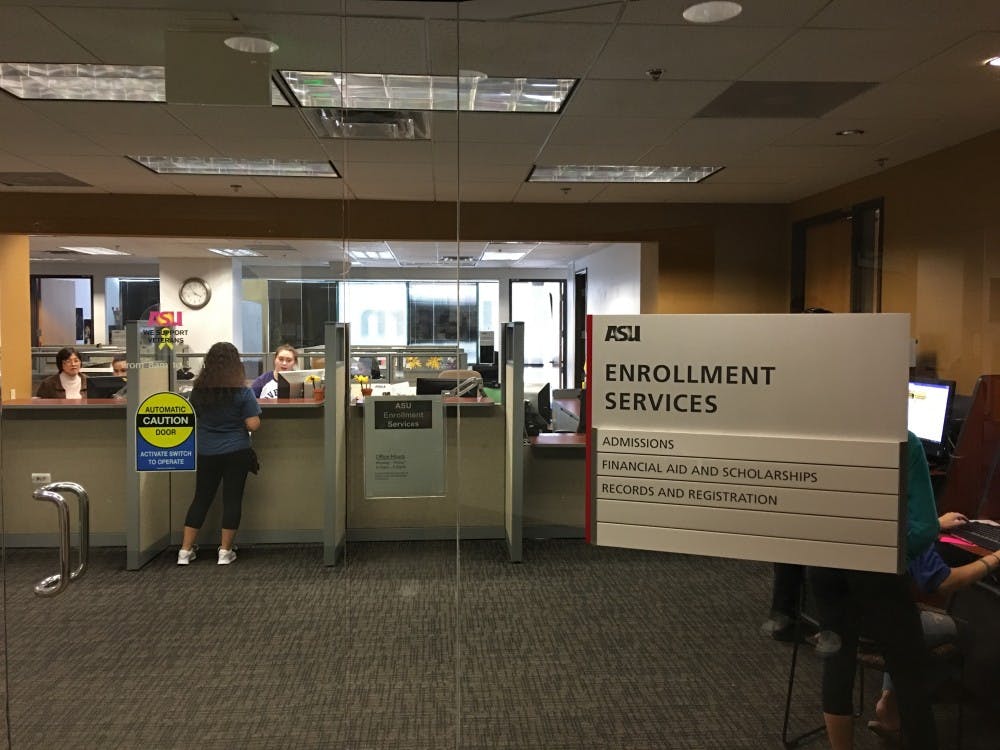A key interactive function of the the Federal Application For Student Aid (FAFSA) went offline last Friday, causing frustration and confusion in its final weeks of availability.
The tool, known as the Internal Revenue Service's Data Retrieval Tool (DRT) allowed students to enter personally identifiable information, and would then pre-populate a significant portion of the application for them.
The DRT was offline for six days before a statement was released by the IRS and the U.S. Department of Education, prompting students to take to Twitter and flood local FAFSA aid centers with calls.
ASU’s priority deadline has already passed, but students are still able to fill out their FAFSA to receive some aid.
Why is the IRS website undergoing planned maintenance the day before FAFSA is due when it's necessary for retrieving my parents' tax info?
— Taylor. (@Taylor_9395) March 9, 2017
According to a joint statement made by IRS and the Department of Education, the tool was taken offline as part of a greater effort to resolve security vulnerabilities attached to instances of identity thefts.
“As part of a wider, ongoing effort at the IRS to protect the security of data, the IRS decided to temporarily suspend the Data Retrieval Tool (DRT) as a precautionary step following concerns that information from the tool could potentially be misused by identity thieves,” IRS and Department of Education said in the statement. “The IRS and FSA are actively working on a way to further strengthen the security of information provided by the DRT.”
The FSA is the office of Federal Student Aid, a part of the Department of Education.
April Osborn, the executive director of the Arizona Commission on Post-Secondary Education said that the tool going offline was a setback after years of progress with the lengthy application.
“It’s a disappointment because we had such progress built up and moving forward because of all the great things that have happened with FAFSA over the last 2 years,” Osborn said. “It’s a big disappointment for those of us that work with the FAFSA, and it’s a big disappointment for the students too, because that was something that did make it easier."
The commission helps students around Arizona with their FAFSA applications.
“We’ve got literally thousands of students out there right now that are working towards getting these things completed," Osborn said.
The Director of the Arizona Family College Savings Program, Deena Lager said that the problem would slow but not stop students from filling out the application.
“Based on the delay and not being able to access the IRS data retrieval tool, it will probably cause students more of a time increase in completing the FAFSA, probably an addition 10-to-15 minutes,” Lager said. “It’s not preventing students from filling it out at all, it’s just preventing the fields from being repopulated for them.”
Osborn and Lager said that the problem with making this process more complicated is that students already forego millions of dollars in federal aid every year.
An interactive map created by NerdWallet, a personal finance website, is based off of publicly available statistics and shows the aid money associated with FAFSA that students give up. More than half of high-school students in Arizona failed to fill out their FAFSA in 2014, when the last year data was available.
NerdWallet
Robert Kelchen, assistant professor of higher education at Seton Hall University said that students applying for the application are not the only people negatively effected by the DRT being down.
“Former students who are enrolled in income-driven student loan repayment plans must recertify their income with the federal government each year, and this takes much longer without the DRT,” Kelchen said. “Some students may get kicked out of income-driven plans as a result of missing filing deadlines, which would increase their monthly payments.”
Students who are paying back debt using federal programs would also risk losing funds, if they are unable to find their original tax documentation, he said.
Chad Aldeman, the principal of Bellwether Education Partners, an education non-profit, said that the timing of the tool going offline was interesting, given the lack of details regarding the security issues.
“There has been no reported cases of it (security issues) that I am aware of,” Aldeman said. “They cited security issues but they didn’t give any advance warning, and they haven’t given us a timeline for when those issues would be dealt with it.”
Reach the reporter at isaac.windes@asu.edu or follow @isaacwindeschef on Twitter.
Like The State Press on Facebook and follow @statepress on Twitter.




